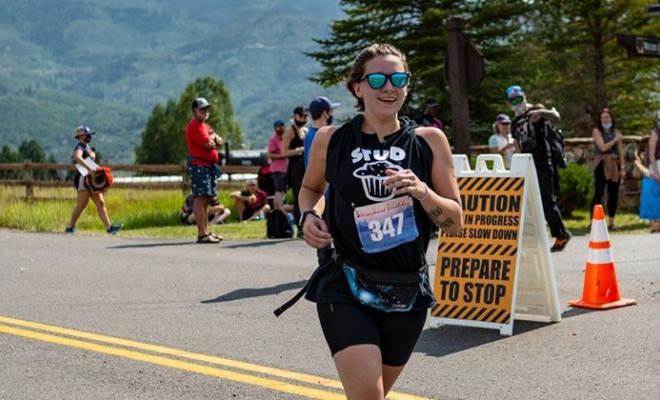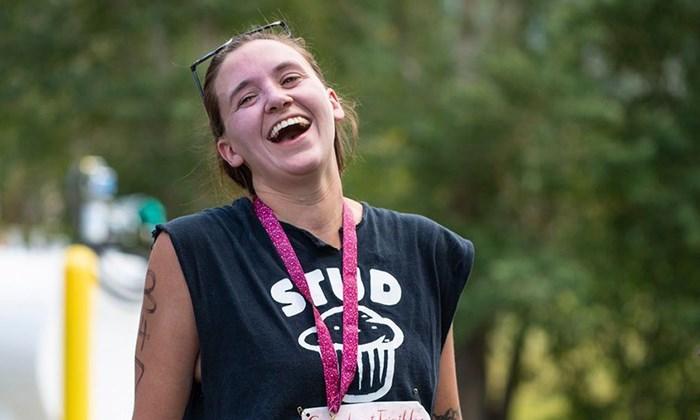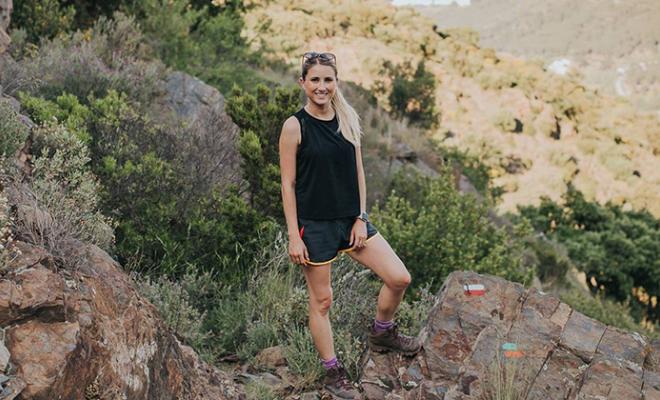The panic sets in during the first 300 meters of the open-water swim. Rachael is in the middle of Lake Catamount in Steamboat, Colo. -- swim cap tight around her head and goggles fastened over her eyes. Her breathing becomes rapid and shallow, and her mind starts to race.
“Though my fitness was there, my brain couldn't process why I was in open water,” she explains.
This brown-blonde, bright-eyed lady is my sister who, like myself, has cystic fibrosis, and since moving to Fort Collins from Western New York, she has completed two CF Foundation Xtreme Hikes, a sprint triathlon, and now she has a full Olympic-distance triathlon under her belt.
The swim is at the very beginning of the race. She has 900 meters left to go, then a 27-mile bike ride, and a 10K run.
Exhale. Exhale, she repeats to herself. “Eventually I just put my head down and start swimming.”
As her older sibling, I can tell some tales about Rachael from when she was younger. I can tell you she used to strongly resist my parents' ultimatums to go to swim practice. She always seemed to “lose her swimsuit” right before it was time to leave, or she would come down with a severe case of butterflies-in-the-stomach. I understood why she resisted so vehemently. Swimming with cystic fibrosis is not only physically difficult, but also it was alienating to be coughing on the sidelines while our teammates splashed by.
Sports practices were the main occasion where our relatively invisible and private illness got paraded in front of our peers -- and as you might assume, it was mortifying to be red in the face and hacking up phlegm.
Our parents encouraged us to push through the discomfort of exercise because they believed it would serve us well in the end. They weren't wrong -- it made us healthier and better equipped to fight CF -- but our relationship with exercise was fated to be complex and uncomfortable, just like wrestling your body into a wet and tangled swimsuit.
Throughout my life, I've had enthusiastic phases of running, yoga, swimming, tennis, and so on; but, I've also had my share of excuses: “I was in shape before I had to go into the hospital and I don't want to restart,” “It's too hot to run during the summer,” and “I think I'll eat this burrito instead.”
Rachael, on the other hand, has shown true grit in overcoming what she describes as “limiting beliefs.” While she's an adventurous hiker and avid cyclist, never in her wildest dreams did she think she was capable of being a runner or a swimmer. And when her roommate, Mary, mentioned a triathlon, forget it! Since she was a kid, she has dealt with significant pain from arthritis brought on by CF-related inflammation and a damaging reaction to an antibiotic. However, since starting Trikafta, her arthritis symptoms have significantly improved, and so has her lung function. Then Mary planted the seed with a simple encouraging promise, “Of course you can complete a triathlon. I'll help you do it.”
Just like conquering that open-water swim, embracing this idea was a mental feat just as much as it was physical. Rachael had to overcome the fear first.
“I was not a runner. I would hate the feeling of losing my breath. I had to ease into it by literally walking for most of the workout,” she said.
Mary prepared for her a training regimen for six days a week. It was not a perfect process with CF. There were days when wildfire smoke and bad ozone prevented Rachael from going outside. Other days, she didn't feel well because of body aches, coughing, or stomach issues -- the usual CF “bad days.” When she had those bad days, Rachael allowed herself the leeway to rest.
“There's a balance of pushing past your fears, but also being aware that your body does have asthmatic or cystic fibrosis responses to exercise,” she said. “Strike that deal with your body that you're going to push it hard, but listen to it when it's time to back off.”
Since I was 5 years old, when my sister was born and diagnosed with CF, I have felt the need to be a role model to her -- to show her that treatments and enzymes aren't so bad and hospitalizations don't have to be scary. Now she is a woman who has developed her own methods of fighting. She jumps into life with an enthusiasm that trickles into every corner, kind of like a fairy waving a wand that suddenly makes a dreary castle sparkle or turn to gold. She has become my role model in more ways than one, and I am empowered seeing her at that triathlon finish line with laughter dancing across her face. In that moment, she's catching her breath -- not because CF has taken it from her, but because she has disavowed her limiting beliefs and reclaimed life's possibilities.
Interested in sharing your story? The CF Community Blog wants to hear from you.






